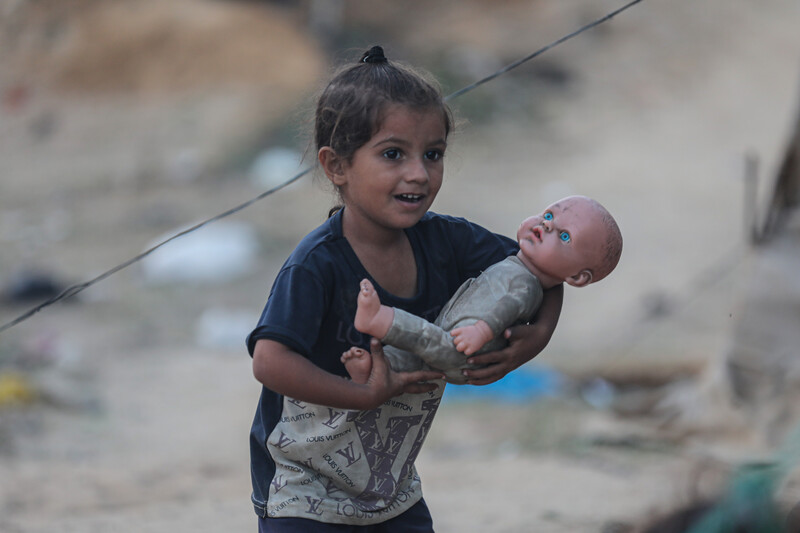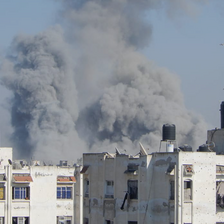The Electronic Intifada 22 July 2024

Children have been disproportionately affected by the genocide in Gaza with at least 14,000 killed so far. A combination of famine and overcrowded, unsanitary conditions have led to a spike in infectious diseases, while young people have witnessed unimaginable horrors, leaving most with trauma. Here, a girl plays with a doll in the rubble of Deir al-Balah on 21 July, 2024.
APA imagesDr. Maysa Abu Sitta is trying, under the most difficult circumstances, to provide psychological support for children in the al-Amal neighborhood in Khan Younis who have lost a parent during the Israeli genocide in Gaza.
She has established a makeshift camp for children, “Hope Will Remain,” in her still-standing home and adjacent tents for the forcibly displaced in the area.
There is no electricity, no lighting, no good ventilation but activities are ongoing and include kite-flying lessons, singalongs and other entertainment activities for children.
The camp is staffed entirely by volunteers and also aims to provide healthy meals and psychosocial support.
“The lack of appropriate places to work in, lack of electricity and lack of equipment and supplies is a major challenge for us,” Dr. Abu Sitta, who is also my mother’s cousin, told The Electronic Intifada.
Nevertheless, volunteers are motivated by a desire to provide the children with at least some temporary relief from the horrors of their situation.
“We are mostly focused on involving them in different activities, including painting, singing and writing,” said one of the volunteers at the camp.
Children most at risk
The lives of children, who make up nearly half of Gaza’s 2.3 million population, have been devastated in Israel’s brutal war on Gaza.
More than 14,000 children have been killed so far, according to Palestinian health officials, roughly half of whom have yet to be fully identified. Many more are suffering from injuries, their lives radically changed.
A further 21,000 children are believed lost, many trapped beneath rubble, detained, buried in unmarked graves, or separated from their families, according to Save the Children.
In March, the UN’s agency for Palestine refugees, UNRWA, said at least 17,000 children had lost one or both of their parents since 7 October, a number that will only have increased since.
Among these are four siblings from the Amar family — Fatima, 12, Hor Aleen, 11, Habiba, 5, and Osama,11 – who lost their father, Hosni, in early February, when he was hit twice in an Israeli drone attack while out looking for food for his family.The family had been displaced from their home when a missile struck a neighbor’s house. But the sanctity they then sought at their grandmother’s house was short-lived. On the third night there, another Israeli missile struck an adjacent home.
As a result, the Amars sought refuge at a Red Crescent building in Khan Younis, where they stayed for months.
Israel has continued to block aid from reaching Gaza, however, and when famine set in, Hosni set off for his ill-fated excursion for food.
Still, the children considered themselves lucky that at least they managed to bury their father.
Thousands of people are believed to have been buried under rubble, with little chance of evacuating their corpses for burial.
Many have been killed in the streets, either en route from shelter to shelter, or out searching for food and water, their bodies left to rot.
At least, said Fatima, they know where their father is.
“I pray for my dad in every prayer,” little sister Habiba said.
Hunger and disease
It is not only direct violence that impacts children’s lives in Gaza.
The availability of medicine is critically limited because Israel has enforced a closure of the Gaza crossings and is obstructing the flow of aid.
The rate of infectious diseases is spiking, in part due to overcrowding in exposed camps for the forcibly displaced, in part due to weakening immune systems as a result of malnutrition, and in part as a result of dirty water, which is also causing previously eradicated diseases like polio to resurface.
Food is at a premium, and prices have skyrocketed even as the ability to bring cash into Gaza has been severely restricted.
It has been reported that only a handful ATMs are still operating in Gaza, and cash is running out at banks.
This has left people struggling to access salaries or savings, or indeed afford scarce food and clean water.
Combined, poverty, famine and disease are among the indirect factors that led researchers with British medical journal The Lancet to project a “conservative estimate” of 186,000 or more casualties caused by Israel’s genocide.
Predictably, the young pay a heavy price.
Trauma
Many children in Gaza, like Kenan, 10, have to bear adult burdens like securing food, water and firewood for their families.
All Kenan wants is respite.
“I miss going to school,” he told The Electronic Intifada. “My only dream is that this war stops and we get the bread we need.”
And almost all children in Gaza – half the 2.3 million population – have witnessed unimaginable horrors over the past nine months.
Yasser Abu Jami, a resident doctor at the embattled Nasser Medical Complex in the western part of Khan Younis, said mothers are increasingly bringing their children to the hospital because they can’t make them stop screaming in fear.
Trauma is not always loud.
Anwar, my 12-year-old cousin from Deir al-Balah, visited me in May, bringing molokhia for a rare delight.
On the way home, he witnessed an Israeli missile strike. He fainted at the scene, but survived, and his mother found him and brought him home.
For one week, he refused to speak or eat and did not want to leave his bed. And while he is better now, his mental health is still impacted.
It is children like these Dr Maysa Abu Sitta hopes to reach with her “Hope Will Remain” camps.
She wants to expand the project to all of Gaza.
“All children need to talk about what they have seen and heard during this war,” she told The Electronic Intifada.
Donya Ahmad Abu Sitta is a writer in Gaza.





